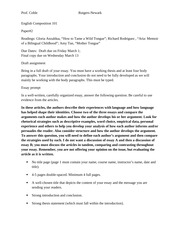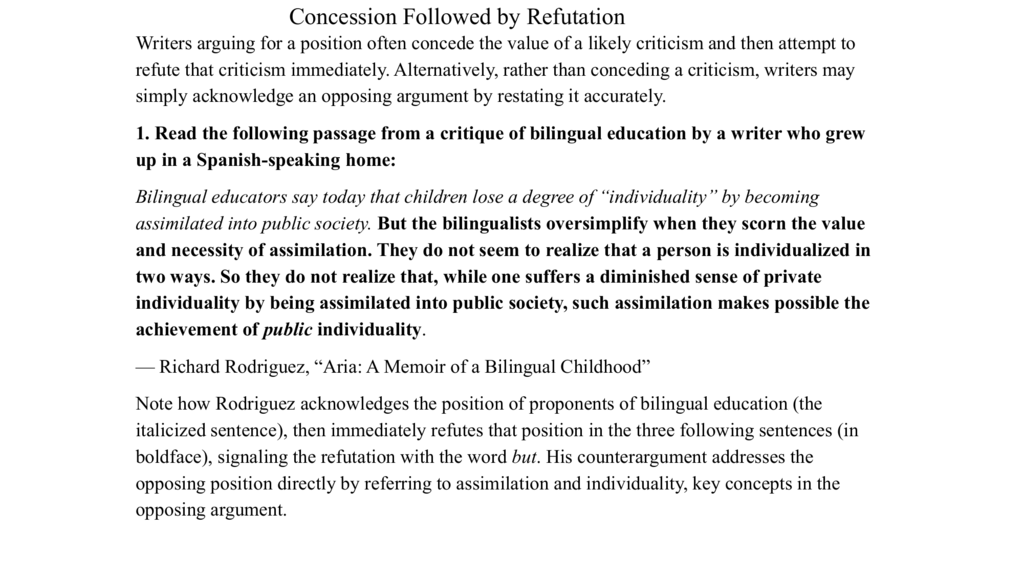- Aria A Memoir Of A Bilingual Childhood Questions
- Aria A Memoir Of A Bilingual Childhood
- Aria: A Memoir Of A Bilingual Childhood Annotated
- Aria A Memoir Of A Bilingual Childhood Rhetorical Analysis

Aria: A Memoir of a Bilingual Childhood Richard Rodriguez, the author of 'Aria: A Memoir of a Bilingual Childhood,' uses his personal experience as a literary scholar and teacher as well as the son of Mexican immigrants living in California to take a firm stand against bilingual. Aria: A Memoir of a Bilingual Childhood by Richard Rodriguez SOAPSTONE Galy Kouyoumjian Speaker Audience Occasion This essay is taken from the book Hunger of Memory, which was published in 1982. The events in this text specifically occur during the mid 1900's, when the author was. 'Aria: Memoir of a Bilingual Childhood' Questions. “I was a bilingual child, a certain kind- socially disadvantaged- the son of working-class parents, both.
A Memoir Of A Bilingual Childhood By Richard Rodriguez 139 Words 1 Pages In the essay “Aria: A Memoir of a Bilingual Childhood” (1981), Richard Rodriguez, an experienced writer, expressed that “it is not possible to for a child – any child – ever to use his family’s language in school” and began expressing his past. Richard Rodriguez Born 1944 in San Francisco, raised in Sacramento, California. Was a literary scholar and teacher until becoming full-time essayist now a columnist and editor for pacific news service and contributor for various magazines and newspapers Hunger of Memory: he.

Beginning
Aria A Memoir Of A Bilingual Childhood Questions

- Remembering the first day of school. Had been preceded by Richards elders not feeling prepared.
- Background of when he was starting school.
- Different demographics “Problem Student” different from the rich kids.
- Hearing his name in English for the first time.
- writing strategies narrative his telling us a story Setting the scene introducing us.
- Content Bilingual education cant speak in different language only knowing 50 English words. Richard is advocating, that it isn’t a good idea “Not to understand Misunderstand school”.
Argument
Aria A Memoir Of A Bilingual Childhood
- Making an argument about bilingual education, personal experiences of being a bilingual child.
- explaining socially disadvantages.
- Explaining who he was and is.
- Key difference language. clarifying how his parents felt. They had so much achieve, they lacked any deep feeling. OF ease belonging in public describing how their life was culturally structured, and the social disadvantages.
- Narrative story telling.
- Content contrasting public speech tense trying to understand. At home they go to there native language.
- First experience with language.
- Writing strategies story telling.
- Content before he was fluent in English speaking. Different pitches, interacted before.
Voices & Discomforting
- Observing his parents confidence when they speak, noticing comparing their public language.
- Their English had an affect because, the worst they spoke. The less power they had.
- Describing how his dad would sound out his words., trying to block out his hearing running into the dark.
- Strategies story telling sounds.
- Content trying to have a comfort tone of voice. Española language embarrassed by the Spanish language.
- Richards mother telling him he belonged in the family.
- Richard was shy connection behavior with progress.
- Richards silence grew stronger
- Strategies story telling.
- Comforting
- Speaking with ease enchantingly private. Difference of sound, his mother calling out for him were words sounds of assurances. Parents English was becoming hard to comprehended
- Difference between sounds narrative less conscious, finding his place in the family.
- Richards mothers Spanish was comforting.
- Transferring public knowledge of English language to make up there own words. This helped sound out vowels bilingual education supported his ability, to public language quickly accomplish as a second language.
- Spanish was a private language as a social advantage.
- Writing strategies liking languages together.
- mocking urgent tones.
- Content using his first language wouldn’t have made him publicly afraid of speaking, would change everything.
- strategies introducing the scene narrative story telling.
- Intrinsically a public language, Spanish was intrinsically private.
- The difference between the two.
- Speaking intrinsically public language at home to improve.
- Playing English games to improve dialect like pronunciations.
- Strategies observe language story telling.
- English was being spoken all around Richard, he couldn’t escape it. This was the only way to get better.
Aria: A Memoir Of A Bilingual Childhood Annotated
Lost/Cost
Aria A Memoir Of A Bilingual Childhood Rhetorical Analysis
- Transitioning from the disadvantage child to belong in public speaking.
- Learning classroom English.
- No longer hearing, American accents, quickened conversations progressing faster.
- ” Soundless”.
- Content silence at home, children were almost to advanced to speak to there parents.
- Strategies no more troubled sounds.
- Their bond was no longer the same English language had changed from los gringos.
- The special feeling of being home desperate.
- Family grew proud as Americans enhancing there life styles.
- stripped of any emotional content.
- Not knowing formal language they would laugh at, Richards fathers English.
- His mother would try joining conversation.
- Content his father wasn’t shy Spanish allowed him to express, what he wanted to say. And the way he felt.
- Using English didn’t allow these things.
- Growing confident in his own indemnity.
- Richard grew carelessly away from ungrammatical speech.
- Strategies Story telling identifying sounds less and less.
- Content success in public speaking, losing conveniently private speech.
- Hearing Spanish words brought back the memory of his childhood.
- Individuality in public society.
- The value of individualize in two ways, achieving public individuality.
- Bilingualism, social and political advantages.
- Gingro society considering , themselves as an American.
- Impersonal public separates, and trivialize the social disadvantages .
- Narrative story telling

